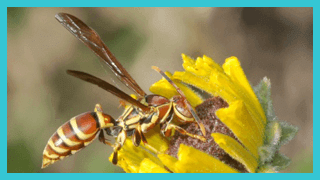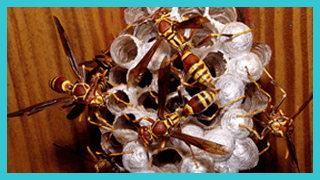Call for a Quick Estimate Today:
(702) 438-9708

 Common Name:
Common Name:
Paper Wasp
Scientific Name:
Polistes species
Order and Family:
Vespidae, Vespid Wasps
Pest Control Recommendation:
Wasp Exterminator & Removal
Description:
1/2-1″ (13-25 mm). Slender, hornetlike. Short 1-segmented “waist” (pedicel) between thorax and abdomen. The upper portion of the head pointed, never notched, as in hornets and yellow jackets. Head and body mostly reddish-brown to black with yellow rings and reddish areas on the abdomen. Male’s face pale, with antennae tips hooked; the female has a brown face. Wings amber to reddish-brown.
Food:
Adult drinks nectar and juices from crushed and rotting fruits. Larva feeds on insects pre-chewed by adults.
Life Cycle:
In spring several females work together to construct uncovered paperlike, a hanging nest of wood pulp and saliva. One female becomes the dominant queen. 1st few generations in summer are all females, cared for as larvae by unmated female workers. Unfertilized eggs produce fertile males. Only mated young queens overwinter under leaf litter and in stone walls. Old queens, workers, and larvae die.
Habitat:
Meadows, fields, and gardens on flowers, and near buildings.
Range:
Throughout North America.
Discussion:
Paper Wasps are much more tolerant of people and minor disturbances than are hornets and yellow jackets. The Golden Paper Wasp (P. fuscatus), 5/8-7/8″ (15-21 mm), is dark reddish-brown and yellow with its first abdominal segment banded yellow. It is common from British Columbia to the Canadian Maritime Provinces, south to West Virginia. The Southwestern Texas Paper Wasp (P. apachus), 1/2-5/8″ (13-15 mm), is reddish-brown with yellow markings. It occurs in Texas, New Mexico, southern California, and Mexico.
WARNING: These wasps will sting if provoked or if their nest is disturbed, but they are usually not aggressive.


Professional, Commercial & Residential Pest Control
Pet & kid friendly, Safe, Organic, Natural Pest Control